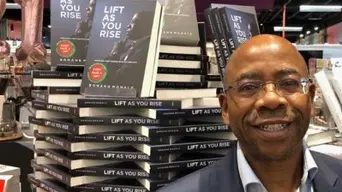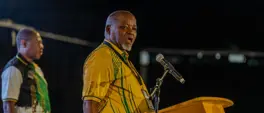Leading with purpose: UFS Chancellor Bonang Mohale on BEE, state capture and his own extraordinary career
Paula Luckhoff
13 November 2025 | 18:32The respected business figure and transformation champion joins Stephen Grootes for an in-depth interview on The Money Show.

Professor Bonang Mohale, UFS Chancellor. Image: X /@bonang_mohale
Professor Bonang Mohale, Chancellor of the University of the Free State (UFS), recently launched his third book, Coming in From the Cold, which tells his story of defying the odds to rise to leadership.
The respected business figure is also seen as a champion of transformation in South Africa, with a resume which includes chairperson of Bidvest and ArcelorMittal SA, CEO of Business Leadership South Africa and chair of the Black Management Forum.
What many people may not know, is that Prof. Mohale started his academic career studying medicine at Wits University for four years during the turbulent 80s.
'That's one of my proudest moments, that I'm a medical student dropout!', he quips.
Growing up in Katlehong outside Johannesburg, Mohale says it was evident that the people in the township who lived in the biggest houses and drove the biggest cars were most often medical doctors - 'so of course I wanted to be a doctor.'
At the time, black students had to applyfor ‘special ministerial consent’ as Wits was a white university.
Mohale recalls the successful applicants, 11 of them, losing 2 hours every day being ‘bussed’ to the Parktown Campus from Glyn Thomas House inside the then-Baragwanath Hospital due to the Group Areas Act. 'We stood no chance', he says.
"That was my second tranche of understanding injustice and that has probably fuelled my activism."
Mohale describes 17 April 1984 as the day he became a free man. when he decided to drop his MBBCh studies.
A pivotal moment was hearing a very eloquent African man speak, whom he later found out was the managing director of the Black Management Forum (BMF) at the time.
"I thought, I want to be like him because, if you're a general practitioner you see one patient at at time, and if you're a supervisor you can talk to many more at a time... So, I was really aware of impact, that early on, and I decided I was going to join the BMF."
With his knowledge of pharmacology from his medical studies, Mohale decided to apply for a job in the pharmaceutical industry.
He joined Pfizer Pharmaceuticals as a sales rep, and then Merck (MSD), working his way up to management positions during his years there.
Since then, Mohale has had a distinguished career at the helm and in leadership roles of several major South African and multinational companies, including Otis Elevators and South African Airways (SAA).
His postgraduate executive education was completed at Ito University, Japan, the International Institute for Management Development in Lausanne, Switzerland, and Darden School of Leadership, Charlottesville, USA. He was also a Professor of Practice at the Johannesburg Business School College of Business and Economics.
Mohale describes how, at 'the genesis of state capture' he lasted only six months in a senior executive role at then-still profitable SAA.
"I left because I could see where it was going... When we saw state capture staring us right in the eyes, nine of us decided to resign en masse. We learned one thing, that politicians always steal when three things happen: When they buy crude, when they buy aeroplanes, and when they buy arms."
Describing the scale of state capture, 'the entire ANC as a movement, chose to be an organised crime syndicate, as we find out every minute since then', Mohale says.
Commenting on the debate around BEE, he says the policy has good intentions as a transformative tool.
"There is no way - anywhere else in the world, where you an have a people like us who've been oppressed by 400 years of colonialism, 98 years of separate development and 48 years of institutionalised apartheid, and then you say 'no, you are free; go and compete with everybody else on an equal footing'."
Contrition is something that is, or should be ongoing, he says.
"You need to continuously ask for forgiveness and be eternally grateful for the mercy shown... because the essence of truth is to let suffering speak, and the people who are speaking are still the advantaged - that's the tragedy."
Scroll up to the audio player to listen to this in-depth interview with Prof. Bonang Mohale
Get the whole picture 💡
Take a look at the topic timeline for all related articles.
Trending News
More in The Money Show

8 January 2026 20:14
Lessons in marketing and reimagining the continent from Brand Africa founder Thebe Ikalafeng

8 January 2026 19:50
Icasa 'serious' about changing rules to enable rollover of unused mobile data

8 January 2026 18:39
Manufacturing activity dropped further in December, but sector optimistic about 2026













